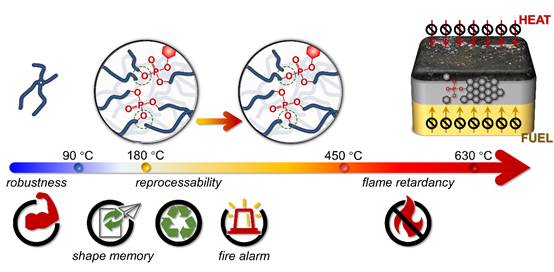Covalent adaptable networks (CANs) span the divide between thermoplastics and thermosets, which makes it possible to recycle and reprocess thermosetting resins. Meanwhile, CANs endow thermosets with intriguing functional properties, such as weldability, self-healing, and stimuli-response behaviors. However, compared with thermosetting polymer materials that are permanently cross-linked, Vitrimers that refer to the cross-linked networks containing associative CANs, suffer from poor mechanical property and decreased thermal stability. Thus, there is an inherent contradiction between mechanical robustness and dynamic reversibility for Vitrimers. Moreover, the inflammability of polymeric materials, accompanied by the massive release of heat and smoke once ignited, constructs a serious threat to human life.
Recently, Prof. Yu-Zhong Wang, Prof. Li Chen and co-workers reported the fabrication of novel catalysis-free epoxy Vitrimers, which are composed of adaptable phosphate networks (APNs), through the introduction of phosphate-containing curing agents. By changing the amount of curing agent, the proportion of APNs and permanent crosslinked structure can be adjusted, so that the mechanical properties, relaxation behavior, and dynamic response of Vitrimers could be tailored. At room temperature, the thermal and mechanical properties of the Vitrimers were comparable to the traditional aromatic amine-cured epoxy resin. Above the thermal transition temperature, Vitrimer showed excellent shape memory, scratched/fractured self-healing properties, and multiple reprocessing behaviors. Above the burning temperatures of Vitrimer, the introduction of phosphate groups enhanced flame retardancy and significantly reduced the heat, smoke, and toxic gas (CO) during burning. Furthermore, the Vitrimers were designed as a fire alarm switch, which illustrated multiple and reversible high-temperature response behavior, even when triggered by flame, which benefited from the excellent thermal stability (flame retardancy) and rapid recovery of Vitrimers. Through the introduction of adaptable phosphate networks, the Vitrimers performed mechanical robustness and reversibility, which was highly desirable but rarely achievable for vitrimers. This work paved the way for designing stimuli-responsive polymers of high-temperature applications and provides new insight into fabricating high-performance covalent adaptable polymer materials.

This work is published in Research entitled “Adaptable Phosphate Networks towards Robust, Reprocessable, Weldable, and Alertable-Yet-Extinguishable Epoxy Vitrimer”. Prof. Yu-Zhong Wang and Prof. Li Chen are the corresponding authors, Jia-Hui Lu, the PhD student in Sichuan University is the first author. This work was supported by the National Natural Science Foundation of China, the 111 Project (B20001), and the Fundamental Research Funds for the Central Universities.
Link: https://spj.science.org/doi/10.34133/2022/9846940
